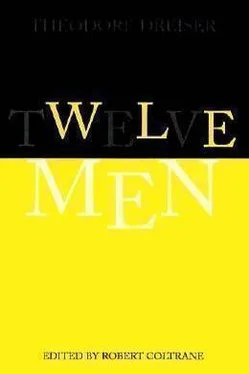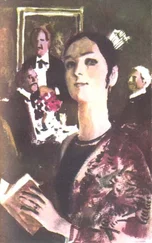Теодор Драйзер - Twelve Men
Здесь есть возможность читать онлайн «Теодор Драйзер - Twelve Men» весь текст электронной книги совершенно бесплатно (целиком полную версию без сокращений). В некоторых случаях можно слушать аудио, скачать через торрент в формате fb2 и присутствует краткое содержание. Год выпуска: 2014, Издательство: epubBooks Classics, Жанр: Биографии и Мемуары, на английском языке. Описание произведения, (предисловие) а так же отзывы посетителей доступны на портале библиотеки ЛибКат.
- Название:Twelve Men
- Автор:
- Издательство:epubBooks Classics
- Жанр:
- Год:2014
- ISBN:нет данных
- Рейтинг книги:4 / 5. Голосов: 1
-
Избранное:Добавить в избранное
- Отзывы:
-
Ваша оценка:
- 80
- 1
- 2
- 3
- 4
- 5
Twelve Men: краткое содержание, описание и аннотация
Предлагаем к чтению аннотацию, описание, краткое содержание или предисловие (зависит от того, что написал сам автор книги «Twelve Men»). Если вы не нашли необходимую информацию о книге — напишите в комментариях, мы постараемся отыскать её.
Twelve Men — читать онлайн бесплатно полную книгу (весь текст) целиком
Ниже представлен текст книги, разбитый по страницам. Система сохранения места последней прочитанной страницы, позволяет с удобством читать онлайн бесплатно книгу «Twelve Men», без необходимости каждый раз заново искать на чём Вы остановились. Поставьте закладку, и сможете в любой момент перейти на страницу, на которой закончили чтение.
Интервал:
Закладка:
"What is it, Mr. White?" he inquired.
"Your Honor," returned the latter in his most earnest and oratorical manner, "this man here, as you may or may not know, is an old and honorable citizen of this county. He has been here nearly all the days of his life, and every day of that time he has earned an honest living. These people here," he said, gazing about upon the interested spectators, "can witness whether or not he was one of the best tobacco pickers this county ever saw. Mayhew," he interrupted himself to call to a spectator on one of the benches, "you know whether Uncle Bobby always earned an honest living. Speak up. Tell the Court, did he?"
"Yes, Mr. White," said Mayhew quickly, "he did."
"Morrison," he called, turning in another direction, where an aged farmer sat, "what do you know of this man?"
Mr. Morrison was about to reply, when the Court interfered.
"The Court knows, Mr. White, that he is an honest man. Now what would you have it do?"
"Well, your Honor," resumed the speaker, indifferently following his own oratorical bent, the while the company surveyed him, amused and smiling, "this man has always earned an honest living until he injured his hand here in some way a number of years ago, and since then it has been difficult for him to make his way and he has been cobbling for a living. However, he is getting so old now that he can't even earn much at that, except in the spring and summer, and so I brought him here to have him assigned a place in the county infirmary. I want you to make out an order admitting him to that institution, so that I can take it and go with him and see that he is comfortably placed."
"All right, Mr. White," replied the judge, surveying the two figures in mid–aisle, "I so order."
"But, your Honor," he went on, "there's an exception I want made in this case. Mr. Moore has a few friends that he likes to visit in the summer, and who like to have him visit them. I want him to have the privilege of coming out in the summer to see these people and to see me."
"All right, Mr. White," said the judge, "he shall have that privilege. Now, what else?"
Satisfied in these particulars, the aged citizen led his charge away, and then went with him to the infirmary, where he presented the order of the Court and then left him.
Things went very well with his humble client for a certain time, and Uncle Bobby was thought to be well disposed of, when one day he came to his friend again. It appeared that only recently he had been changed about in his quarters at the infirmary and put into a room with a slightly demented individual, whose nocturnal wanderings greatly disturbed his very necessary sleep.
"I want to know if you won't have them put me by myself, Mr. White," he concluded. "I need my sleep. But they say they can't do it without an order."
Once more the old patriarch led his charge before the Court, then sitting, as it happened, and breaking in upon the general proceedings as before, began:
"Your Honor, this man here, Mr. Moore, whom I brought before you some time ago, has been comfortably housed by your order, and he's deeply grateful for it, as he will tell you, and as I can, but he's an old man, your Honor, and, above all things, needs his rest. Now, of late they've been quartering him with a poor, demented sufferer down there who walks a good deal in his sleep, and it wears upon him. I've come here with him to ask you to allow him to have a room by himself, where he will be alone and rest undisturbed."
"Very well, Mr. White," said the Court, "it shall be as you request."
Without replying, the old gentleman turned and led the supplicant away.
Everything went peacefully now for a number of years, until finally Uncle Bobby, having grown so feeble with age that he feared he was soon to die, came to his friend and asked him to promise him one thing.
"What is it?" asked the latter.
By way of replying, the supplicant described an old oak tree which grew in the yard of the Baptist Church some miles from Danville, and said:
"I want you to promise that when I am dead, wherever I happen to be at the time, that you will see that I am buried under that tree." He gave no particular reason save that he had always liked the tree and the view it commanded, but made his request a very secret matter and begged to be assured that Mr. White would come and get his body and carry it to the old oak.
The latter, always a respecter of the peculiarities and crotchets of his friends, promised. After a few years went by, suddenly one day he learned that Uncle Bobby was not only dead but buried, a thing which astonished him greatly. No one locally being supposed to know that he was to have had any special form of burial, the old patriarch at once recalled his promise.
"Where is his body?" he asked.
"Why, they buried it under the old white oak over at Mt. Horeb Church," was the answer.
"What!" he exclaimed, too astonished to think of anything save his lost privilege of mercy, "who told them to bury him there?"
"Why, he did," said the friend. "It was his last wish, I believe."
"The confounded villain," he shouted, amusingly enough. "He led me to believe that I was the only one he told. I alone was to have looked after his burial, and now look at him—going and having himself buried without a word. The scoundrel! Would you believe that an old friend like Uncle Bobby would do anything like that? However," he added after a time, "I think I know how it was. He got so old and feeble here of late that he must have lost his mind—otherwise he would never have done anything like that to me."
And with this he was satisfied to rest and let bygones be bygones.
De Maupassant, Junior
He dawned on me in the spring of 1906, a stocky, sturdy, penetrative temperament of not more than twenty–four or –five years of age, steady of eye, rather aloof and yet pervasive and bristling; a devouring type. Without saying much, and seeming to take anything I had to say with a grain of salt, he managed to impress himself on me at once. Frankly, I liked him very much, although I could see at a glance that he was not so very much impressed with me. I was an older man than he by, say, ten years, an editor of an unimportant magazine, newly brought in (which he did not know) to turn it into something better. In order to earn a few dollars he had undertaken to prepare for the previous editor a most ridiculous article, some silly thing about newspaper writing as a career for women. It had been ordered or encouraged, and I felt that it was but just that it should be paid for.
"Why do you waste your time on a thing like that?" I inquired, smiling and trying to criticize and yet encourage him at one and the same time, for I had been annoyed by many similar assignments given out by the old management which could not now be used. "You look to me to have too much force and sense for that. Why not undertake something worth your time?"
"My time, hell!" he bristled, like a fighting sledge–dog, of which by the way he reminded me. "You show me a magazine in this town that would buy anything that I thought worthy of my time! You're like all the rest of them: you talk big, but you really don't want anything very important. You want little things probably, written to a theory or down to 'our policy.' I know. Give me the stuff. You don't have to take it. It was ordered, but I'll throw it in the waste basket."
"Not so fast! Not so fast!" I replied, admiring his courage and moved by his contempt of the editorial and book publishing conditions in America. He was so young and raw and savage in his way, quite animal, and yet how interesting! There was something as fresh and clean about him as a newly plowed field or the virgin prairies. He typified for me all the young unsophisticated strength of my country, but with more "punch" than it usually manifests, in matters intellectual at least. "Now, don't get excited, and don't snarl," I cooed. "I know what you say is true. They don't really want much of what you have to offer. I don't. Working for some one else, as most of us do, for the dear circulation department, it's not possible for us to get very far above crowd needs and tastes. I've been in your position exactly. I am now. Where do you come from?"
Читать дальшеИнтервал:
Закладка:
Похожие книги на «Twelve Men»
Представляем Вашему вниманию похожие книги на «Twelve Men» списком для выбора. Мы отобрали схожую по названию и смыслу литературу в надежде предоставить читателям больше вариантов отыскать новые, интересные, ещё непрочитанные произведения.
Обсуждение, отзывы о книге «Twelve Men» и просто собственные мнения читателей. Оставьте ваши комментарии, напишите, что Вы думаете о произведении, его смысле или главных героях. Укажите что конкретно понравилось, а что нет, и почему Вы так считаете.









